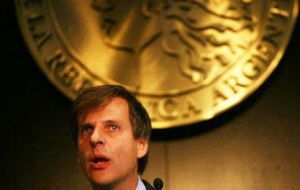MercoPress. South Atlantic News Agency
Clash for Argentina’s Central bank reserves turns into political turmoil
 Martin Redrado is challenging the Kirchner couple’s “bulldozer” policies
Martin Redrado is challenging the Kirchner couple’s “bulldozer” policies Martin Redrado was “restored” Friday to his post as President of the Argentine Central Bank following an injunction from Federal Judge María José Sarmiento. Redrado had been removed Thursday by President Cristina Fernández de Kirchner through an emergency decree for having resisted releasing 6.6 billion US dollars from the bank’s reserves
Redrado had refused to leave his post and had been holding meetings with several judicial advisors and attorneys. Sarmiento issued the decision in a matter of hours, in spite of Redrado's lawyer having asked for legal protection.
Earlier, Sarmiento had a different injunction filed by the opposition forces Civic Coalition and PRO union. The ruling blocks the Bicentennial Fund, --for which the 6.6 billion USD had been earmarked--, until Congress holds session.
The Bicentennial Fund with the 6.6 billion USD in foreign currency reserves was ordered by Mrs. Kirchner as an instrument to meet Argentina’s growing debt obligations this year. Cristina Kirchner, whose popularity ratings are languishing at below 30%, faces another tight financing year this year. Economists say her government may need to raise as much as 7 billion USD to meet total debt obligations of 13 billion.
The row has rattled financial markets, Argentina’s risk standing and deepened political tension.
Martin Redrado argues that “reserves must stay in the CB since they belong to all Argentines, not to someone in particular”. He added that “I am committed to defend monetary stability and currency exchange predictability in Argentina“.
“I’ve has put himself at stake to defend that and if there's any alternative to the use of that money, it's the Congress the one who has to make that decision.”
Meanwhile, Cabinet Chief Anibal Fernández talked to the press and not only defended President Cristina Kirchner's decision to remove Redrado but also accused Vice President Julio Cobos of “conspiring against the government”. He anticipated that the government would appeal Federal Judge Sarmiento’s rulings.
“The judge's ruling is provisional. It suspends the decree until Congress can give an opinion,” a court source said, asking not to be named. The injunction came from an administrative law court.
The conflict has raised political uncertainty in Argentina just as Mrs Kirchner's cash-strapped government seeks to charm investors and issue global bonds eight years after a massive debt default. Argentine bonds, stocks and the peso weakened due to investor concerns over the stability of Argentina's institutions and fears the dispute could delay the sovereign debt swap expected for later this month.
President Cristina Kirchner urged opponents to let her govern and defended using part of the Central Bank's 48 billion USD in reserves to service the nation's debts.
“It's much better to use the reserves than to take out loans with an interest rate of 15 or 14%. It's common sense” the President said.
Legal experts are divided over whether lawmakers or the courts can overturn presidential decrees, but Kirchner administration opponents say the decrees are unconstitutional because both measures needed approval from Congress.
“This is generating a conflict between the branches of government, in the judicial branch and the legislative branch, that is unprecedented in our democracy,” said Christian Gribaudo, a member of Congress for the centre-right PRO party.
Congress is in recess until March, but opposition lawmakers started to cancel their vacations and some vowed to seek an emergency session of the lower house on January 20 to debate the presidential decrees.
Critics say Argentina's President wants to use the reserves to pay debt to avoid cutting social spending that is crucial to boosting her popularity ahead of a 2011 presidential election. Some analysts say the strategy risks stoking political conflict.
“This has happened for two reasons: The government needs money and secondly, it's about governing style. They can't stand anyone saying 'no' to them,” said Manuel Mora y Araujo, a political consultant.
Political tensions have been high in Argentina for much of Cristina Kirchner’s term, but Argentine assets have rebounded in recent months on hopes the government would soon settle with holders of 20 billion USD in bonds left over from a huge 2001/02 default.




Top Comments
Disclaimer & comment rules-

-

-

Read all commentsuhum... I read somewhere from some che idiot that “it's going to be an excited year in Argentina”...laugh. It's a matter of time the argies will default “again” on their debt...clock is ticking, tic toc tic toc..laugh.
Jan 09th, 2010 - 10:33 am 0relax...relax
Jan 09th, 2010 - 04:21 pm 0circumstance is better than US..UK..and few others ...!!!!!!!
When will the K's realize that you can not rule by decree in a country based on a representative legislature.
Jan 10th, 2010 - 12:31 pm 0Commenting for this story is now closed.
If you have a Facebook account, become a fan and comment on our Facebook Page!